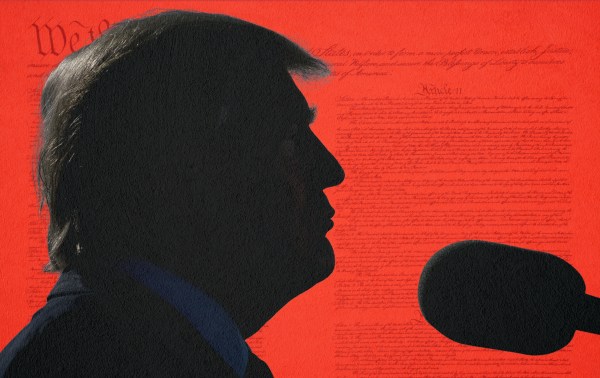Donald Trump spoke for more than 90 minutes last Thursday as he closed out the Republican National Convention in Milwaukee. The highly anticipated speech was his first since he was injured in a failed assassination attempt at a campaign rally in Butler, Pennsylvania, on July 13.
After providing his firsthand account of the shooting and aftermath, Trump spoke extensively on foreign policy, the economy, and social issues. In the course of his remarks, Trump made dozens of claims related to both his record and that of his Democrat opponents. Below are some of the most notable.
Stock Market
“We handed over a stock market that was substantially higher than just prior to Covid,” Trump said. The claim is true. The S&P 500 index, which tracks the performance of the 500 largest companies listed on U.S. stock exchanges, reached a pre-pandemic high of 3,386.15 on February 19, 2020. By March 23, 2020, the market had declined 33.9 percent to a low of 2,237.40 in response to the economic headwinds created by COVID-19 lockdowns. The S&P 500 index rebounded quickly from this low and rose to 3,851.85 by the time Trump left office in January 2021. Overall, the index increased by 69.6 percent during Trump’s four years in office. Under President Joe Biden’s tenure thus far, the index has risen by approximately 43 percent.
Border Security
In his speech, Trump claimed that he oversaw the most secure border in the country’s history. “Just a few short years ago under my presidency, we had the most secure border … in the history of our country, in the history of the world,” Trump remarked. His claim is mostly true, if slightly exaggerated.
During Trump’s presidency, the U.S. recorded some of its lowest southwest border encounters in decades—though this trend began before Trump took office. Monthly border encounters fluctuated between approximately 40,000 and 160,000 between 2001 and 2008, but dropped substantially beginning in 2009. Aside from a spike in crossings during the spring of 2019, border encounters remained relatively low throughout the Obama and Trump administrations, particularly during Trump’s first two years in office when they hit record lows. Southwest border encounters have increased substantially under Biden, peaking at more than 250,000 in December 2023, the highest monthly total ever recorded.
Inflation
Trump also made several claims about inflation and cost of living increases in America. “Under this administration, our current administration, groceries are up 57 percent, gasoline is up 60 and 70 percent, mortgage rates have quadrupled, and the fact is it doesn’t matter what they are because you can’t get the money anyway,” Trump said.
The Dispatch Fact Check reported in a previous piece that grocery prices had risen by approximately 20.9 percent between January 2021 and June 2024, far less than the 57 percent claimed by Trump. The story also found that gasoline prices had risen by closer to 47 percent, not 60 to 70 percent. Mortgage rates have risen substantially—by approximately 130 percent—but have not quadrupled.
“We’ve had the worst inflation we’ve ever had under this person,” Trump said later about Biden. Inflation did rise substantially under Biden, to a peak annual rate of 9.1 percent in June 2022. While this is the highest inflation rate recorded in decades, it is not the highest ever recorded. In March 1980, the U.S. recorded a 12-month change in the consumer price index of nearly 15 percent during a period that became known as the Great Inflation. The country saw even higher inflation rates during World War I and its aftermath, rising to approximately 18.5 percent between December 1916 and June 1920.
Russian Warships in Cuba
Toward the end of his speech, Trump claimed that Russian warships and nuclear submarines were operating in Cuba, only 60 miles off the U.S. coast. “Do you know that?” Trump asked the audience. “The press refuses to write about it.” Trump is correct that Russian warships were operating around Cuba, but his claim lacks important context.
In June, four Russian naval vessels passed through the Caribbean en route to Cuba for naval exercises. The Dispatch Fact Check reported at the time that these exercises were pre-planned and did not pose a threat to U.S. interests.
On Wednesday morning, Cuba was set to welcome four Russian naval vessels—a frigate, an oil tanker, a salvage tug, and a nuclear submarine—into its territorial waters ahead of air and naval exercises taking place later this month. The two nations are longtime allies. The Russian ships sailed within 30 miles of southern Florida, according to U.S. officials, but military officials characterized the drills as typical. “Russia’s deployments are part of routine naval activity which pose no direct threat or concern to the United States,” a U.S. Northern Command spokesperson told The Dispatch Fact Check in an emailed statement.
The ships reportedly departed Cuba five days later.
If you have a claim you would like to see us fact check, please send us an email at factcheck@thedispatch.com. If you would like to suggest a correction to this piece or any other Dispatch article, please email corrections@thedispatch.com.








Please note that we at The Dispatch hold ourselves, our work, and our commenters to a higher standard than other places on the internet. We welcome comments that foster genuine debate or discussion—including comments critical of us or our work—but responses that include ad hominem attacks on fellow Dispatch members or are intended to stoke fear and anger may be moderated.
With your membership, you only have the ability to comment on The Morning Dispatch articles. Consider upgrading to join the conversation everywhere.